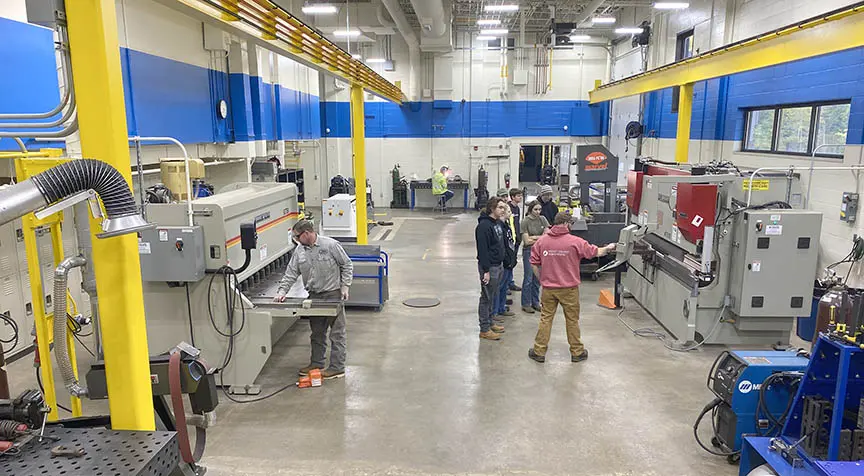

Nicolet College Celebrates October as Manufacturing Month
Persevering through a pandemic, serious supply chain issues, and a myriad of other challenges has paid off at Nicolet as the college celebrates October as Manufacturing Month with a fully functional Birchwoods Center which now houses all manufacturing disciplines under one roof.
“It has been a long road and sometimes not a very easy road, but we made it,” said Jeff Labs, Nicolet dean of Trade, Industry and Apprenticeships.
“And as we intended, the biggest winners are the students. They’re now learning cutting-edge skills on state-of-the art equipment. Graduates are then taking these skills into the workplace where they’re earning family-supporting wages and manufacturers are getting the skilled workforce they need to be efficient and profitable.”
Over the past 20 years Nicolet has brought in numerous manufacturing disciplines as dictated by ever-changing industry demand. Over those years the different disciplines were housed in different buildings across campus.
“Back then there was no way to envision how the demand for manufacturing training would grow to the extent it has today,” Labs explained. “And over the past few years we started to see the need to bring everything under one roof, and that’s where we are today. And I have to say it is absolutely fabulous. I have no hesitation saying this is a top-tier facility and one of the best manufacturing training sites in the state.”
Manufacturing programs now housed in the Birchwoods Center, which underwent a $2.2 million remodel, are Electromechanical Technology, Industrial Maintenance Mechanic, Industrial Electronics Technician, and Industrial Mechanical Technician, Metal Fabrication, and Welding.
“There’s a lot of cross-competencies between programs, just as there are between jobs in manufacturing plants,” Labs noted. “By being in the same building, students will also get a baseline understanding of the different professions and how they can work in sync with each other to accomplish any given task.”
That close proximity to one another also recently came in handy for the college itself. One of the pieces of Metal Fabrication machinery developed an electrical issue. Instead of hiring a repair contractor, and instructor and students from the Electromechanical program walked across the hall, diagnosed the problem, and identified the part that needed to be replaced.
“That’s about as real world as it gets” he said. “And it was fun to see how the students were quite proud of themselves, and deservedly so. They accepted the challenge and solved the problem, just as they’d have to do out in the workplace.”
The college has also converted all manufacturing training over to the competency-based education, or CBE, format.
The classes in each of these programs also offer a high degree of flexibility, with students completing the course at the times that are right for them and around their busy lives.
In order to accomplish this, the curriculum is broken down into smaller chunks, known as competencies.
Once students have proven that they’ve mastered one competency, they move on to the next. When they’ve demonstrated proficiency with all of the required competencies, they are awarded college credits and ultimately a college degree.
Throughout any given academic year there are nine different start dates, three for every term.
Upcoming start dates include Monday, Nov. 7, and Monday, Jan. 9.